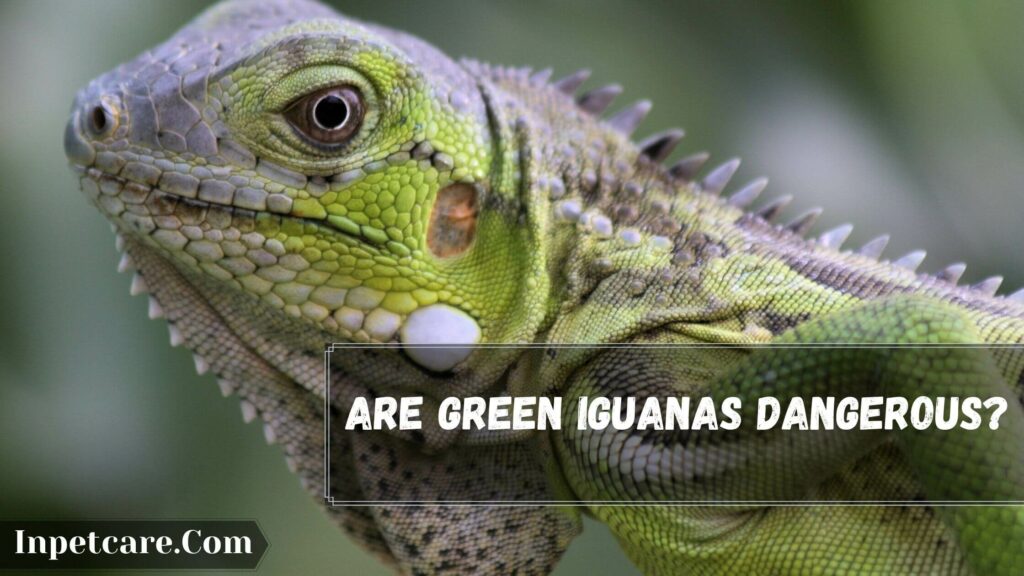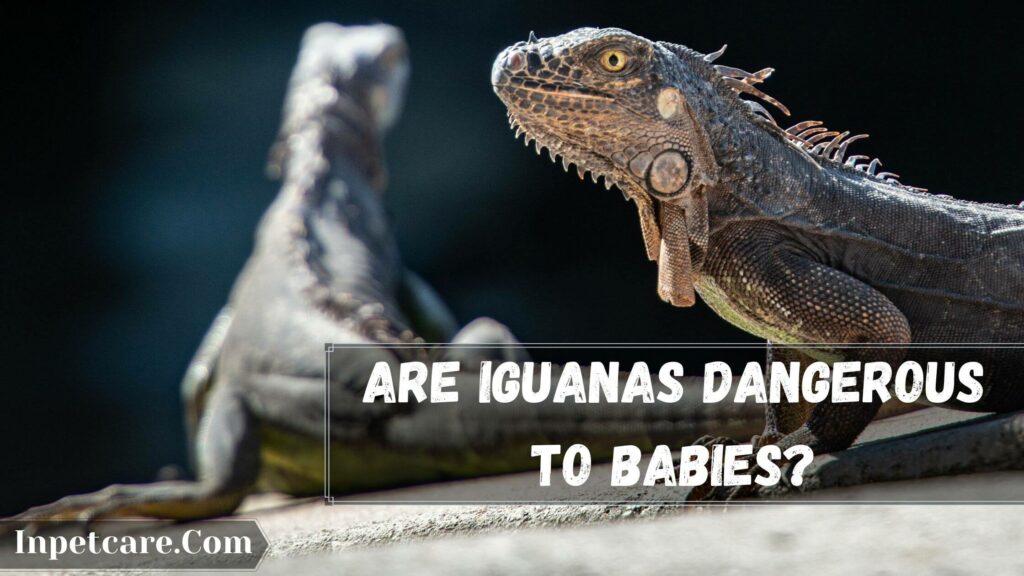Before you adopt any reptiles, you should know if they pose any danger to you or your family or not. One such reptile is green Iguana. In this article, I will talk about whether green iguanas are dangerous or not, and we will also talk about whether their bite will be fatal to human health.
Knowing this kind of thing will always keep you on the safe side, and you can avoid bad things from happening. So, are green Iguanas dangerous?
Post Contents
Are Green Iguanas Dangerous?

Green iguanas raised in captivity are often friendly and rarely exhibit any aggressive behavior. Captive-raised green iguanas are not dangerous. Green Iguanas living in the wild carry many hazardous viruses and parasites if transmitted to people with a weak immune system.
Adding to this, Green Iguanas also carry salmonella in their feces which is harmful to all people, including pregnant women and small children. It would help if you kept a safe distance from a wild green Iguana. Most green Iguana tends to be calm and friendly, but sometimes they can get spooked.
Most captive-raised Green Iguanas are so quiet that they would never bite anyone unless they were threatened. Hand raised Green Iguanas also never try to escape when being handled. All this behavior makes green Iguana a friendly option as a pet and makes these reptiles very attractive to families.
In my opinion, captive-raised iguanas are not at all aggressive compared to Green iguanas living in the wild. Captive-raised Green Iguanas can also be tamed where those who hail from the wild will never like to be even touched.
When you come across a green Iguana living in the wild, make sure to have a safe distance to avoid being bitten or slapped by its tail. A slap from its tail is strong enough to cause severe hurt or even injury to your bones.
Adding to this, a wild Green Iguana’s bite will hurt and increase the chances of parasitic infection. Green Iguanas can also draw blood. However, Green Iguanas will never bite in a way that you will lose the finger or something like that.
If you come across an aggressive green Iguana, it is recommended to read their body language first, as they don’t bite without warning signals. Let’s talk about if their bite is dangerous or not.
Are Green Iguanas Bites Dangerous?
Green Iguana’s bite is poisonous to small animals but not to humans. Depending upon where the Iguana hails from, their bite can be infectious to humans. The captive-raised green iguanas are unlikely to bite you. A bite from a wild green Iguana can be fatal if not appropriately cleaned.
A bite from them can hurt and even bleeds slightly. Believe it or not, their bite causes a nasty wound that needs to be treated. You should always thoroughly wash the edge and apply some Antibacterial cream to keep the salmonella and other bacteria from being transmitted to your blood.
Their mouth carries many bacteria and parasites, which can get us sick if contacted. However, a green Iguana bite is not as dangerous as a Komodo Dragon, which could do some real damage with only one bite. A chance of becoming sick is high if bitten by a wild green Iguana.
Are Green Iguanas Dangerous To Humans?
Green Iguanas are dangerous to humans as their mouths carry many bacterias. Adding to this, Green Iguana’s body also has salmonella, which can cause bowel infections and other diseases in humans. Unfortunately, Iguana can be dangerous to humans if precaution is not taken correctly.
You are more likely to get in contact with the salmonella as an Iguana does not even need to bite you for that. The critters that crawl on their feces often get bacteria and parasites on Iguana’s body, making the disease more transmitting. Even though there is a chance of getting sick, it doesn’t mean you will get sick.
People with a weak immune system are more vulnerable to Iguana. If your immune system is healthy and exemplary, it is almost impossible for you to get anything from Iguana. However, it is still recommended to take precautions.
7 Precautions To Take From Green Iguanas
- After touching or handling a green Iguana, wash your hand thoroughly using warm water and soap.
- Also, avoid kissing your Iguana.
- Plus, it would help if you always considered cleaning that tank every day because maintenance is essential.
- It would help if you also considered removing uneaten food and feces to reduce bacteria.
- Avoid putting your Iguana on your bed or getting them anywhere in the kitchen.
- Get a stool sample to the nearest veterinarian weekly or monthly for a parasite test.
- If a wild green Iguana bites you, consider consulting a doctor to ensure you are okay.
Are Iguanas Dangerous To Babies?

Yes, Green Iguanas can be extremely dangerous for babies as they have a fragile immune system. The bacterias and salmonella are more likely to get transmitted to babies and cause life-threatening diseases. It is never recommended to let your baby touch the Iguana or let the Iguana be around the baby.
It is always advised to wash your hand properly before touching your baby, especially if you have felt the Iguana before. Baby, including children under five years old and pregnant women, are more vulnerable to salmonellas and bacteria of green iguanas.
Interesting Further Reading
- What Do Green Iguana Eat? (21+ Safe Foods)
- Do Iguanas Need Uvb: How Much Uvb Do Iguanas Need?
- Can Iguanas Eat Mushrooms? 5 Risks involved
FAQ
CONCLUSION
Do you have all the ideas on the question of are green iguanas dangerous. I have not written this article to scare you but to make you aware. There are many aspects of adopting a pet, and one such is knowing if it is poisonous or not. Since Iguanas are nonvenomous to humans, they are widely adopted as pets.
However, if you have a weak immune system, avoid adopting one. There are a few people that got sick from keeping iguanas. Instead of calling me wrong, the things you read above are hard facts that should be shared with every reptile lover and keepers. You will be on the safe side as long as you follow all the rules given above.
![Are Green Iguanas Dangerous? [5 Myths and Facts]](http://www.inpetcare.com/wp-content/uploads/2023/02/taniya-1.jpg)
94% of pet owners say their animal pal makes them smile more than once a day. In 2007, I realized that I was made for saving Animals. My father is a Vet, and I think every pet deserves one. I started this blog, “InPetCare”, in 2019 with my father to enlighten a wider audience.
![Are Green Iguanas Dangerous? [5 Myths and Facts]](https://www.inpetcare.com/wp-content/uploads/2022/05/are-green-iguanas-dangerous-1.jpg)